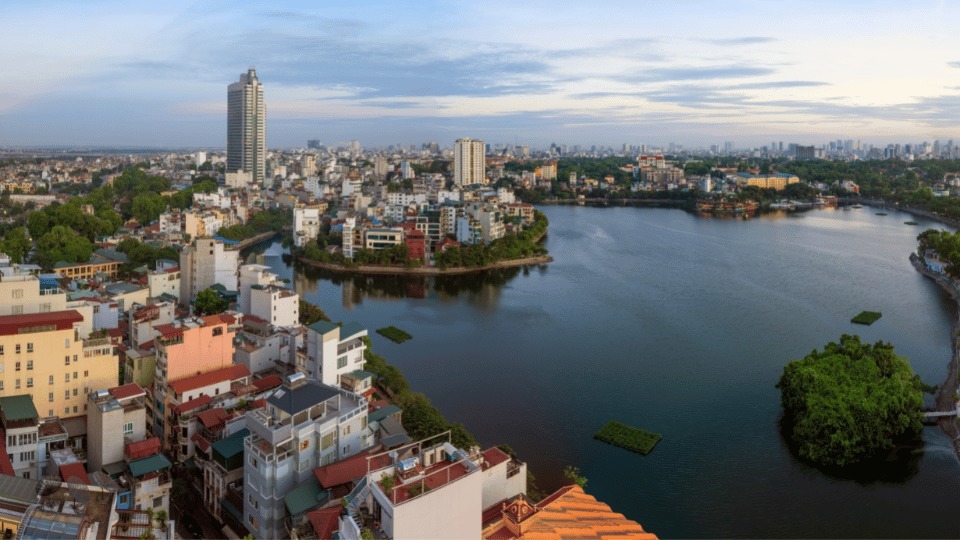It's crucial to become familiar with the various Hanoi neighborhoods before you begin your search for a rental home. There are many different neighborhoods to choose from in the sizable city of Hanoi, each with a distinctive personality and amenities. Ba Dinh, Hoan Kiem, and Tay Ho are a few of the areas where digital nomads and foreign residents frequently congregate.
You can determine which neighborhoods are best for your needs and preferences by researching the various neighborhoods. This can include elements like being close to your place of employment or favorite recreational activities, having access to public transportation, and having cafes and restaurants nearby. To get a sense of how life is in the various areas, you can also read forums, blogs, and social media groups specifically for digital nomads in Hanoi.
It's also a good idea to ask locals about Hanoi neighborhoods. Locals will likely know the most recent ins and outs of the neighborhoods, and their advice can be very valuable in your search for a place to stay, regardless of how much research you do online.

Step 2: Determine Your Budget
Set a budget for rent and other expenses once you have a thorough understanding of the different Hanoi neighborhoods. In Hanoi, rent can range from $400 to $1,600 per month or more, depending on the neighborhood, size, and quality of the rental.
Planning a budget for supplementary related expenses like utilities, internet, and transportation is also crucial. It's a good idea to have a firm idea of how much you can spend before you start looking for a rental home because these costs can add up.
You can also cut your costs in half if you find a buddy or roommate in Hanoi to split costs with.
Step 3: Find A Place To Rent
You can find a rental home in Hanoi using a variety of resources, such as Facebook groups for the city's digital nomads and online classifieds like Batdongsan and Chotot. While it can be expensive, you can also hire a real estate agent to find a rental property.
Set up a viewing when you find a property you like so you can learn more about it and ask questions. Bring a list of questions to the viewing, including questions about rent, utilities, and any other costs associated with the property.

Step 4: Sign A Lease Agreement
The next move is to sign the lease once you've found a rental home that you like. This legally binding document contains all of the terms and conditions of your rental, including the rent, the length of the lease, and any rules and regulations.
Before you sign the lease agreement, make sure you understand all of its terms and conditions completely. If necessary, ask for clarification. A local lawyer or real estate agent should review the lease to ensure that your rights are upheld and it is reasonable.
Step 5: Payment And Move-in
Following your signature on the lease agreement, you will have to make the required payments, which include rent and a deposit. In Hanoi, a month's worth of rent serves as the security deposit, and rent is frequently paid in advance.
You can move in and begin your new life in Hanoi as soon as all the required payments have been made. Before you move in, take pictures of the property and note any damages or other problems to avoid being held accountable for them after you leave.

Step 6: Know The Rules
It's crucial to be aware of and follow these rules because landlords in Hanoi frequently have strict regulations regarding things like noise levels, smoking, and pets. In case your situation changes, it's a good idea to be aware of the procedures for renewing or breaking your lease.
Step 7: Expectations For Amenities
You can count on having access to standard conveniences like electricity, water, and internet when renting a home in Hanoi. The location and the property can have a big impact on the speed and quality of these amenities.
When you view the property, it's a good idea to inquire about the amenities and make sure you know what is and is not included in the rent. For instance, while utilities may be included in some rental agreements, they might not in others.

Step 8: Language Barriers
In Hanoi, English is widely spoken, especially in the neighborhoods where expats and digital nomads frequently reside. Although it will make it simpler for you to communicate with your landlord, neighbors, and others, it is still a good idea to have a basic understanding of Vietnamese.
Step 9: Length Of Rental Contracts
Even though it's possible to find shorter-term rentals, rental agreements in Hanoi typically last for at least a year. It's a good idea to inquire about this when you view the property because the length of the lease will vary depending on the property and the landlord.
Step 10: Required documents
You will typically be required to provide proof of identity, such as a passport or ID card, and proof of income, such as a salary statement or bank statement, when renting a property in Hanoi. A reference from a previous landlord or employer may also be requested of you.

Living in Hanoi as a digital nomad or expat can be a rewarding experience, but it's important to be aware of the rules and prerequisites in advance. Finding the right place to call home in this exciting and vibrant city only takes a little planning and research.





